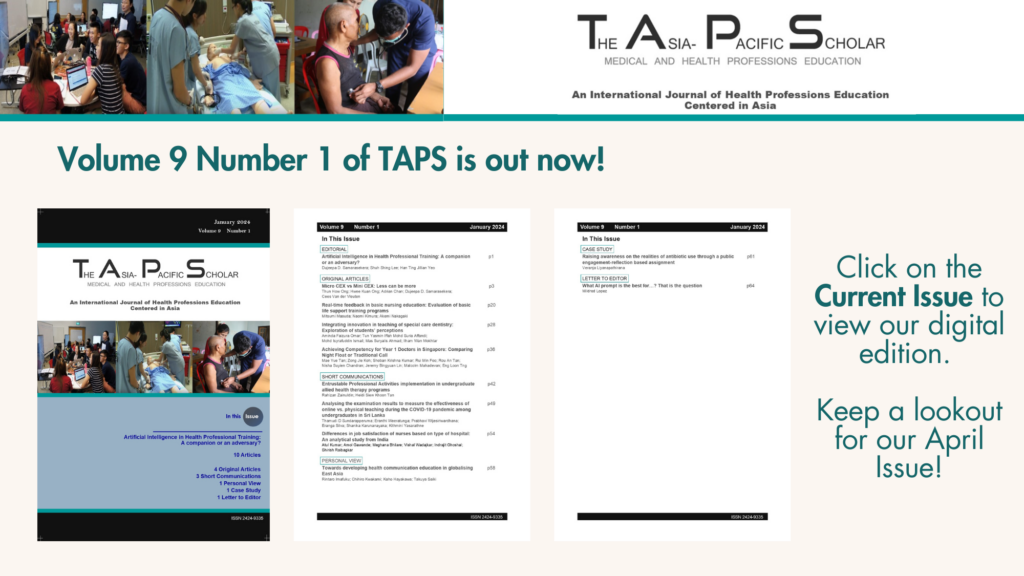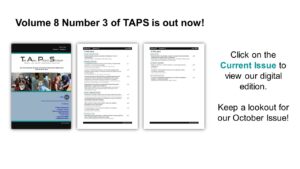Asian perspectives on volunteering at the frontlines for medical students
Submitted: 1 June 2021
Accepted: 21 June 2021
Published online: 5 October, TAPS 2021, 6(4), 148-149
https://doi.org/10.29060/TAPS.2021-6-4/LE2545
Wai Jia Tam, Divya Hemavathi & Tikki Pang
Yong Loo Lin School of Medicine, National University of Singapore, Singapore
Dear Editor,
Engaging medical students in frontline efforts during the COVID-19 pandemic has varied greatly worldwide (Kachra & Brown, 2020). This paper illustrates policy challenges in student volunteerism, focusing on Singapore. Although Asia often seeks policy guidance from the West, it possesses a unique culture, political climate, regional solidarity, evolution of the disease, and learnings from prior pandemic responses to SARS and MERS, which warrants distinctive guidelines.
Following the spread of COVID-19 in early 2020, many countries, including Singapore, rapidly suspended student involvement in direct patient care activities and converted clinical training to online modes (Kachra & Brown, 2020). However, others like the United Kingdom and University of Toronto provided detailed guidelines and activated processes set-up during past pandemics for interested medical students to volunteer (Kachra & Brown, 2020; Medical Schools Council, 2020).
In Singapore, by June 2020, 95% of the COVID-19 cases were from migrant worker facilities. Medical students were offered reimbursements for help with contact tracing by Ministry of Health. Manpower strains existed, especially when lockdown ended, as healthcare workers returned to their usual duties. This presented an opportunity for medical students to continue with risk communication and community engagement (RCCE) efforts. However, direct medical student involvement was disallowed, until community transmission rates stabilized in April 2021. Even then, students were barred again before volunteer recruitment began, as community cases rose in May 2021.
Scepticism of the value of RCCE, ethical concerns about the safety and uncoerced, voluntary participation of students, political concerns to manage public fear of community spread through medical students, and educational and practical barriers to coordinating medical training with on-ground efforts contributed to the impediment of the mobilization of medical students in frontline efforts at the start of the pandemic.
Clear, evidence-based guidelines may be articulated to overcome these challenges and enable safe and effective deployment of students to provide thoughtfully matched and risk-mitigated help in context during evolving pandemic situations, even in the immediate aftermath of an outbreak. This exposure to global, social and equity dimensions of pandemic impacts helps foster future public health leaders. Given Singapore’s position in the intersection between the East and the West, it can lead such education policy reform in Asia, providing valuable input for policy development regionally and internationally.
Medical education policy is affected by governments, public opinion, international issues, and health policies. Comparative evaluation of medical education policies in Asia, may reveal their influence on health outcomes.
Note on Contributor
Dr. Wai Jia Tam conducted the literature search, conceptualised and drafted the manuscript. Prof. Tikki Pang and Divya Hemavathi critically revised the manuscript for intellectual content. All authors read and approved the final manuscript.
Funding
No funds, grants or other support was received.
Declaration of Interest
The authors have no conflicts of interest to declare that are relevant to the content of the article.
References
Kachra, R., & Brown, A. (2020). The new normal: Medical education during and beyond the COVID-19 pandemic. Canadian Medical Education Journal, 11(6), 167-169. https://dx.doi.org/10.36834%2Fcmej.70317
Medical Schools Council. (2020, March 25). Statement of expectation: Medical student volunteers in the NHS. https://www.medschools.ac.uk/news/msc-issues-statement-of-expectation-for-medical-student-volunteers-in-the-nhs
*Tam Wai Jia
Dean’s Office, Yong Loo Lin School of Medicine,
National University of Singapore,
Level 11, NUHS Tower Block,
1E Kent Ridge Road,
Singapore 119228, Singapore
Tel: +65 9627 3580
Email: waijia@nus.edu.sg
Announcements
- Best Reviewer Awards 2024
TAPS would like to express gratitude and thanks to an extraordinary group of reviewers who are awarded the Best Reviewer Awards for 2024.
Refer here for the list of recipients. - Most Accessed Article 2024
The Most Accessed Article of 2024 goes to Persons with Disabilities (PWD) as patient educators: Effects on medical student attitudes.
Congratulations, Dr Vivien Lee and co-authors! - Best Article Award 2024
The Best Article Award of 2024 goes to Achieving Competency for Year 1 Doctors in Singapore: Comparing Night Float or Traditional Call.
Congratulations, Dr Tan Mae Yue and co-authors! - Fourth Thematic Issue: Call for Submissions
The Asia Pacific Scholar is now calling for submissions for its Fourth Thematic Publication on “Developing a Holistic Healthcare Practitioner for a Sustainable Future”!
The Guest Editors for this Thematic Issue are A/Prof Marcus Henning and Adj A/Prof Mabel Yap. For more information on paper submissions, check out here! - Best Reviewer Awards 2023
TAPS would like to express gratitude and thanks to an extraordinary group of reviewers who are awarded the Best Reviewer Awards for 2023.
Refer here for the list of recipients. - Most Accessed Article 2023
The Most Accessed Article of 2023 goes to Small, sustainable, steps to success as a scholar in Health Professions Education – Micro (macro and meta) matters.
Congratulations, A/Prof Goh Poh-Sun & Dr Elisabeth Schlegel! - Best Article Award 2023
The Best Article Award of 2023 goes to Increasing the value of Community-Based Education through Interprofessional Education.
Congratulations, Dr Tri Nur Kristina and co-authors! - Volume 9 Number 1 of TAPS is out now! Click on the Current Issue to view our digital edition.

- Best Reviewer Awards 2022
TAPS would like to express gratitude and thanks to an extraordinary group of reviewers who are awarded the Best Reviewer Awards for 2022.
Refer here for the list of recipients. - Most Accessed Article 2022
The Most Accessed Article of 2022 goes to An urgent need to teach complexity science to health science students.
Congratulations, Dr Bhuvan KC and Dr Ravi Shankar. - Best Article Award 2022
The Best Article Award of 2022 goes to From clinician to educator: A scoping review of professional identity and the influence of impostor phenomenon.
Congratulations, Ms Freeman and co-authors. - Volume 8 Number 3 of TAPS is out now! Click on the Current Issue to view our digital edition.

- Best Reviewer Awards 2021
TAPS would like to express gratitude and thanks to an extraordinary group of reviewers who are awarded the Best Reviewer Awards for 2021.
Refer here for the list of recipients. - Most Accessed Article 2021
The Most Accessed Article of 2021 goes to Professional identity formation-oriented mentoring technique as a method to improve self-regulated learning: A mixed-method study.
Congratulations, Assoc/Prof Matsuyama and co-authors. - Best Reviewer Awards 2020
TAPS would like to express gratitude and thanks to an extraordinary group of reviewers who are awarded the Best Reviewer Awards for 2020.
Refer here for the list of recipients. - Most Accessed Article 2020
The Most Accessed Article of 2020 goes to Inter-related issues that impact motivation in biomedical sciences graduate education. Congratulations, Dr Chen Zhi Xiong and co-authors.









